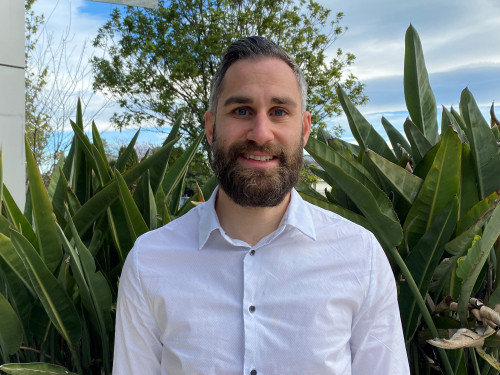
Physiotherapist Tom Eckett was at the COVID-19 coal face when the pandemic first hit the United Kingdom in 2020.
He spent long days at Leeds General Infirmary in full Personal Protective Equipment (PPE) working to improve patients’ breathing difficulties and ease their discomfort.
But after a year-and-a-half on the COVID wards and countless boardgames during lockdown, he decided to make the move to New Zealand.
He started at Hawke’s Bay Hospital in June 2021 as a Senior Physiotherapist and has progressed to be the Allied Health COVID-19 Educator at Te Whatu Ora - Te Matau a Māui, Hawke’s Bay.
Mr Eckett believes his experience during the first wave of the pandemic has equipped him well for the role.
“When the pandemic first struck in the UK – it was like nothing I’d experienced before.”
In the Intensive Care Unit (ICU) and COVID-19 ward, Mr Eckett worked with some very complex respiratory patients who were very unwell.
“The most at-risk populations were people with underlying health issues. However, healthy people were sometimes hit just as hard by the original COVID-19 strain – I remember a young, fit triathlete on the ward and wondering how he ended up there! Fortunately, he made a full recovery,” he says.
“It was a busy time with hundreds of COVID-19 patients. You needed to be adaptable and really work as a team in a fast-paced environment.
“I found it was the little things that made a big difference, like building 10 minutes into your time with a patient to set up a video call with family who weren’t allowed to visit.”
Mr Eckett says he learned a lot in the height of the pandemic but is pleased he made the move to Hawke’s Bay.
“I was envious of my friend living a lockdown-free life in New Zealand so I converted my degree and moved over. I had a few months without face masks which was bliss but it also felt strange having come from full days in PPE. COVID followed me a few months later.”
In his new role as Allied Health COVID-19 Educator, Mr Eckett soaks up all things COVID-related, digests it, and passes on the key information to colleagues.
“It’s a lot of research and working alongside teams to assist them in providing the best care to patients with COVID-19 symptoms.”
Mr Eckett says Hawke’s Bay clinicians are now managing patients with acute COVID-19, lingering symptoms and Long-COVID. However, he says it’s important to remember that the Omicron variants seen in New Zealand are not as severe as the original strains seen in the United Kingdom.
“Most people who have COVID-19 will start to feel better in seven to 10 days, however, some may still have symptoms such as fatigue and brain fog for up to 12 weeks – which is normal.
“I know a slow recovery can be frustrating, but it’s really important to listen to your body and if you’re struggling to return to ‘normal activities’ then ease back off.
“The research suggests that people who try to push through their symptoms are more inclined to suffer from Long-COVID – which is currently defined as ongoing symptoms more than 12 weeks after the initial infection.”
Mr Eckett says the good news is that research suggests just five to 10 percent of Omicron sufferers will get Long-COVID, while it was up to 30 percent of people who had the Delta variant.
There are also a number of things people with lingering symptoms can do to manage their health.
“If you’re fatigued, you might need to plan your days and pace yourself so you don’t aggravate your symptoms. Taking frequent breaks will also help if you’ve got brain fog.
“Getting a good night’s sleep is also very important when you’re recovering from an illness. Everyone is different, so the most important thing is to listen to your body.”
Anyone wanting to find out more about managing post-infection symptoms or Long COVID can contact their GP or read more online here.






Post your comment
Comments
No one has commented on this page yet.